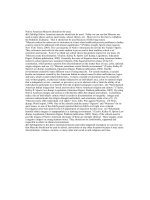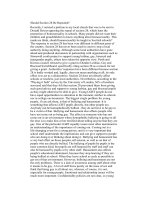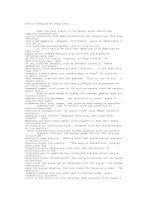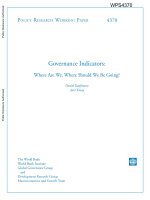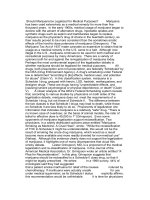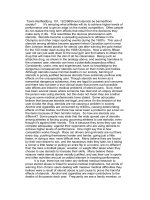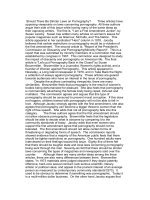Should homework be banned
Bạn đang xem bản rút gọn của tài liệu. Xem và tải ngay bản đầy đủ của tài liệu tại đây (28.6 KB, 3 trang )
Topic: Should homework be banned?
Should homework be banned?
In theory, homework plays an important part in learning. It provides students with
necessary skills that they will need to apply to their jobs or life in the future.
However, here is another problem with homework in elementary school. Primary
Children rarely deal with the time management skills or strong emotions accompanied
by exercises, so responsibility belong to parents. Homework for these students is
unnecessary. If they have to take too much time to do homework, it will lead to
negative impact such as stress, poor health and less time for family and social
activities.
According to Jenna Flannigan, homework makes seventy percent of students are
stressed. It really is a worrying figure. In Vietnam, after eight hours at school, students
have to attend extra classes that their parents register, then they spend about two hour,
even more on doing homework. Having too much time for homework make students
depressed to learn, and just doing simple exercises to finish and to get points. In
addition, not every student is a prodigy from birth. Each child has an individual
qualities and personality. So there are students who good at learning language, while
the others are quite quickly in calculation. However, there are some parents who do
not accept the true ability of the child, do not let the child attend their favorite
subjects. They expect children to study well in all subjects. If parents do not accept
their ability, place high expectations on the child, parents invisibly create pressure to
their children. Besides, studies have shown the link between the amount of homework
and their marks. Students who have more homework get lower marks than the others.
Harris Cooper indicated that there is no evidence to suggest that doing homework
help improve academic capacity of elementary school students. These things
demonstrate that homework not only make students be under pressure but also do not
help student develop their abilities.
Another defective influence of homework on students is health damage. Two to three
hours of homework a night, with a result that students often go to bed late. It will
adverse unhelpful effects on the development and health of children. They are always
in the fatigue mood, difficult to concentrate on learning. According to a new study
published by researchers from the Medical University of Ohio, USA, children who get
sleep after 9 pm are at risk of obesity in puberty. Moreover, they also often suffer for
eyes diseases such as myopia. When you walk into a classroom with 30 students, the
two thirds of which have to wear thick glasses ... is very ordinary. Beside
nearsightedness, farsightedness and astigmatism are also common diseases of the eye.
In recent years, when they begin in grade six, there are many students who are short
and thin like students in grade three or four. It is a very painful fact for primary
students. Teachers and parents must work together to provide solutions to help
children have leisure time after school.
In addition to stress and poor health, an unexpected impact that homework brings is
students have no time for their families and social activities. According to Valerie
Strauss, more time playing than studying will advance to superior education for
children is unscientific. But more time studying does not mean better results, it only
makes students more exhausted. Students spend most of their time at school, and two
to three hours for homework makes them have no time for other activities. After a
hard day of learning. What children need are fun and warmth when they have dinner
with their families. On the other hand, they have to eat in a hurry to keep up with
hours of homework. It weakens links and sharing between parents and children.
Furthermore, children also do not have time to participate in social activities. In
childhood, play is essential for children's development. By playing with the other,
children can increase their language skills and social skills. Scott Barry Kaufman
Ph.D presents that thanks to join in pretend playing early, children have the
opportunity to enhance the flexibility of perception and creativity. Pretend play also
help children control their behavior. Additionally, children getting homework have no
free time to participate in sports which make them stronger and healthier. In short,
spending time on homework take away students’s chance to practice skills and social
relationship.
To conclude, homework is unreasonable and unnecessary for elementary school
students. It make them be under pressure. More serious is that it leads to the risk of
harm to health. Last but not least, children lose the ability to develop skills and create
social relationships. Though it still has difficulty banning homework in primary
school, government and schools should find out the best solution to help students get
a balance between learning and playing time.
‘
References
Harris Cooper, (2016, Mar 30). Homework destroys brain elementary school children,
should be "banned" to secondary school! Bao moi. Retrieved from
/>aign=facebook
Jenna Flannigan, (2016, Aug 11). Is too much homework bad for kids' health?
Healthline News. Retrieved from
/>ress-031114#1
Medical University of Ohio, (2016, Jul 19). Harm when kids stay up late. Yeu tre tho.
Retrieved from
/>35.html
Scott Barry Kaufman Ph.D, (2012, Mar 06). The need for pretend play in child
development. Psychology today. Retrieved from
/>d-play-in-child-development
Valerie Strauss, (2015, Aug 21). Why young kids need less class time — and more
play time — at school. The Washington post. Retrieved from
/>
Scott Barry Kaufman Ph.D, (2012, Mar 06). The need for pretend play in child
development. Psychology today. Retrieved from
/>d-play-in-child-development

